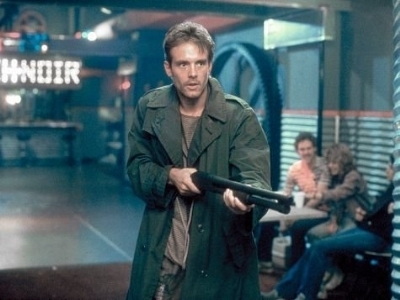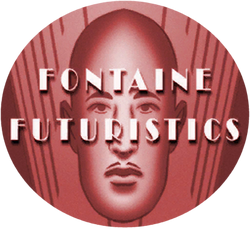
So gamers everywhere are a bit peeved (oh who am I kidding, they've already collected the torches and pitchforks) over the new version of digital rights management (DRM) software shipping out on the PC port of
Assassin's Creed II, the console versions of which have received rave reviews for slick, atmospheric gameplay and more finely-tuned mechanics carried over from the original. UbiSoft, on the other hand, is getting the proverbial vegetable justice for the unprecedentedly stringent anti-piracy software required to even install the game, much less play it.
A brief rundown on DRM software: anti-piracy measures originated as little more than a coding trick to prevent users from copying the game CDs or DVDs; since these are typically required to be in the computer's CD/DVD-ROM drive during play, this method prevents your average consumer from buying a single copy and distributing it for free to all his/her friends. More recently, publishers have started requiring users to register the software online, which "unlocks" the game on your computer (Steam and Games for Windows Live are a couple of examples). Combined, these methods effectively prevent most of the population from actually initiating any software piracy, but that's of little consequence when a small percentage of those people can "crack" the game and make it available for download to anyone with an internet connection.
Assassin's Creed II is taking anti-piracy to a whole new level. Besides the by-now obligatory internet activation, PC gamers will be
required to be connected to the Internet
at all times during play. If your connection goes out for longer than a few seconds, all progress since the last checkpoint in the game will be lost.
What I want to address in this post is the extremely awkward and unpleasant position in which most PC gamers now find themselves, should they want to play recent and upcoming games. We are either forced to acquiesce to such blatantly ridiculous anti-piracy measures, or start illegally downloading our games.
Before I get into that, though, I'll explain why it's ridiculous. Time was when I could walk into a store, purchase an item, take it home, and use it. End of happy capitalist consumer story. But not anymore. Let's say I want to go into GameStop or wherever and buy a copy of
BioShock 2 or
Batman: Arkham Asylum. When I take it home, the game is
unplayable until I've asked permission from Windows Live to use my
legally purchased product. Apparently exchange of currency is no longer enough to get you certain retail items in this society
built on rampant capitalism. Much as I despise that economic system most of the time, I must say that not having complete control over something I've paid a decent chunk of cash for (currently about $50 and rising for a new PC game) really,
really pisses me off.
Further, it cannot be said under any circumstances that video game developers and publishers are doing anything other than raking in the money hand over fist.
Grand Theft Auto IV, the
most expensive video game ever made, cost $100 million. It generated $500 million
in the first week after it was released. It has apparently shipped 13 million copies worldwide, which, if we do a little simple math at 50 bucks a pop, brings the total up to $650 million.
Returning to
ACII, which has only been released on Xbox 360 and the PS3 so far, we find it has sold roughly 8 million copies as of February 10 this year. A little more math (this one costing $60), and we get a total of $480 million. UbiSoft is apparently a little cagey about their production costs, but if we go with high-end numbers from
this article,
ACII probably did not cost UbiSoft more than $34 million. Let's see... that's a profit of 446 million dollars, which is a higher net profit than 17 of the
20 most profitable films of all time (only
The Lord of the Rings: The Return of the King,
Titanic, and
Avatar have had a better turnaround).
Assassin's Creed II has only been out since November, and the PC version still hasn't been released. Here's my general feeling toward UbiSoft on the subject of software piracy:

I'm so sorry, UbiSoft, I didn't realize you had fallen on such hard times. Please, let me shell out 60 dollars, which is between 15-20% of my average paycheck, in order to play (but not physically own) a game that has made more money for you in four months on only two of its three systems than
Jurassic Park did for Universal in its entire run through movie theaters. Piracy is pretty much only possible on PC versions of video games, and as we know, they're certainly not hurting for console sales. What's really at stake then, if not their company's survival? I think this whole thing is about property. The fat cats of video gaming are pissed off that some guy (who likely knows more about computers than they ever will) can sit in his room at home and alter the software so that it can be used without paying their increasingly exorbitant prices.
Okay, okay, enough sarcasm and simple arithmetic. I believe, as many do, that video games are just as much an art form as books, music, films, and television programs (the extremely variable quality of these is not currently under discussion), and as such, their creators do indeed deserve reasonable compensation for their efforts. All of these media (except PC games) are available to me in some fashion for free or for a small fee before I actually have to pay to own them -- which is a good thing, because it's extremely disappointing to spend one's hard-earned money on some form of media only to find out that it sucks. (Case in point: since I didn't get to the theater in time, I am the unfortunate owner of
The Matrix Revolutions.) Instead of spending stupid amounts of money developing more and better DRM software, which is guaranteed to alienate honest PC users and only slightly more likely to confound pirates, why not develop a system in which PC gamers can test-play a game before we have to buy it? Or perhaps figure out a way that we could play a game only once before having to pay the full amount, like seeing a movie at the theater vs. buying the DVD? I'd be fine with UbiSoft's new technique if, say, it was significantly cheaper and good for only a single playthrough -- provided I could later purchase the game, permanently, in its complete form (no bullshit Internet connections required).
Demos do
not count toward this end, and I'll tell you why. If I was given a demo of the original
Assassin's Creed, containing only the first couple of levels, I would probably run out and buy the game right then and there; I mean, in the first hour of play, the game appears to be truly amazing. What a demo wouldn't tell you, though, is that the game is extremely repetitive through its entirety and downright annoying by the last hour or so. I know this from recent experience, and as a consequence I will not be buying the game. On the other hand, I played through
Arkham Asylum once and purchased it immediately afterward. Like I said, good work deserves good compensation. Another good example: I recently played
BioShock for the first time, too, and I plan on buying it myself at some point. In any case, my point is that I should not have to pay money for something that I won't like, and at this point in time, there is no way for a PC gamer to make that determination aside from a) borrowing a game, or b) downloading it illegally. That needs to change.
Granted, these methods still probably wouldn't stop piracy, but then, it seems unlikely that anything ever will. What it
would do is retain PC gamers' trust, and, ideally, encourage developers to produce games that are so good, gamers will
want to spend their money.


















